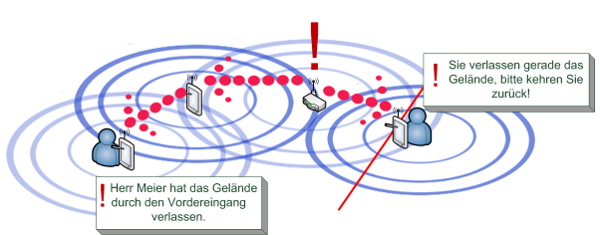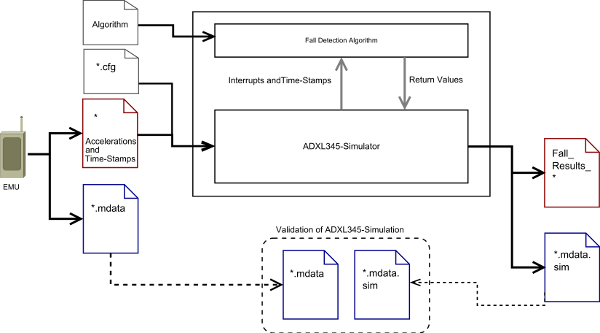Assisted Living Project - Kompass
As a result of the aging societies in the western world, the impact of dementia, with its characteristics like disorientation and obliviousness is becoming a significant problem to an increasing amount of persons and the health system. To enable such dementia patients to regain a self determined life, we have developed a mobile orientation system called Kompass (formerly KopAL) that assists dementia patients in every day problems, like remembering appointments, keeping track within their familiar surroundings as well as informing caretakers in critical situations, with a focus on minimal operational costs and a speech based human computer interface. While easy-to-use was one of Kompass' requirements, the system itself uses and experiments with new technologies in the area of Mobile Ad Hoc Networks (MANETs), VoIP, and embedded systems. Further, Kompass ( Technical Report in German) is an interdisciplinary project.
Cooperation Partners:
- Seniorenheim Florencehort, LAFIM, Stahnsdorf
- Computer Engineering, University Potsdam
- Applied Computer Linguistik, University Potsdam
- Differentielle Psychologie, Persönlichkeitspsychologie
- Psychologische Diagnostik, University Jena
Image

Kompass supports dementia patients, their relatives, and caretakers in nursing homes in the following situations: Reminding on upcoming social or regular events (e.g. meals, choir meetings or remedial gymnastics) as well as medications. Patients getting lost in their surroundings on unaccompanied walks. Patients panic even in common situations or require assistance (e.g. after a collapse).
An additional aspect of "Assisted Living" is support during communication. "IntelliTalk" is the application of a method of "Augmenttive and Alternative Communication" (AAC). Communication support through image cards / language Cards has been adapted for use on smartphones or tablets. The speech impaired, e.g. after stroke, can use these to improve communication and reactivate their language skills.
Fall detection Simulator and Algorithm for the accelerometer with hardware preprocessing
Image

Mobile fall-detection systems that use accelerometers (as the ADXL 345) with data pre-processing capabilities, enable processors to remain longer in low power modes and therefore can achieve extended device lifetimes. Since falldetection on these accelerometers is partially executed in hardware, the development and comparison of fall-detection algorithms requires direct evaluation on the hardware and increases complexity. We introduce a fall-detection simulator for the development and comparison of fall-detection algorithms for accelerometers with and without partial inhardware pre-processing. In addition comprehensive records of fall-situations and daily living activities were generated for the simulator from recording movements. With the help of the simulator, the sensitivity of a given fall-detection algorithm could be improved from 33% to 93%.
Image

The ADLs, fall records algorithm or simulator are available for non commercial use to other research institutions.
Press Releases
Bericht über das Kompass-Projekt: "Ein Kompass für den Alltag", S.14
Universitätszeitung Portal
01/2015
Das Handy klingelt, wenn der Besitzer stürzt
MAZ Lokal
17.07.2014
Bericht über das Kompass-Projekt: "Bits + Bites fürs Altersheim", S.13
Universitätszeitung Portal
01/2013
Publications
Indoor Positioning: A Comparison of WiFi and Bluetooth Low Energy for Region Monitoring
Alexander Lindemann, Bettina Schnor, Jan Sohre and Petra Vogel
In Proceedings of the 9th International Conference on Health Informatics (HEALTHINF)
Rome, Italy, February 2016
Threshold-based Fall Detection on Smart Phones
Tobias Gimpel, Simon Kiertscher, Alexander Lindemann, Bettina Schnor and Petra Vogel
In Proceedings of the 8th International Conference on Health Informatics (HEALTHINF)
Lisbon, Portugal, January 2015
Threshold-based Fall Detection on Smart Phones
Sebastian Fudickar, Alexander Lindemann and Bettina Schnor
In Proceedings of the 7th International Conference on Health Informatics (HEALTHINF)
Angers, France, March 2014
Energie-effizientes Notfall-Handgerät für Senioren
Sebastian Fudickar, Benjamin Oschatz and Bettina Schnor
Best Practice Wireless in der Hauptstadtregion Berlin-Brandenburg, ISBN: 978-3-9815065-2-5
Berlin, Germany, June 2013
An Energy Efficient Mobile Device for Assisted Living Applications
Sebastian Fudickar, Max Frohberg, Sebastian Taube, Philipp Mahr and Bettina Schnor
2nd IEEE Online Conference on Green Communications
September 2012
Fall-Detection Simulator for Accelerometers with in-Hardware Preprocessing
Sebastian Fudickar, Christian Karth, Philipp Mahr and Bettina Schnor
5th Workshop on "Affect and Behaviour Related Assistance" at PETRA 2012
Heraklion, Greece, June 2012
KopAL Appointment User-interface - An Evaluation with Elderly
Sebastian Fudickar, Sebastian Färber and Bettina Schnor
3rd Workshop on "Affect and Behaviour Related Assistance" (ABRA) at PETRA 2011
Kreta, Greece, May 2011
KopAL - Orientierungssystem für demente Patienten
Sebastian Fudickar and Bettina Schnor
Poster at the 4th Deutschen AAL - Kongress 2011
Germany, Berlin, January 2011
KopAL - An Orientation System For Patients With Dementia
Sebastian Fudickar , Bettina Schnor, Juliane Felber, Franz J. Neyer, Matthias Lenz and Manfred Stede
Behaviour Monitoring and Interpretation Book of Well Being, ISBN: 978-1-60750-730-7
IOS Press, April 2011
KopAL - A Mobile Orientation System For Dementia Patients
Sebastian Fudickar and Bettina Schnor
International Conference on Intelligent Interactive Assistance and Mobile Multimedia Computing
Germany, Rostock, November 2009
